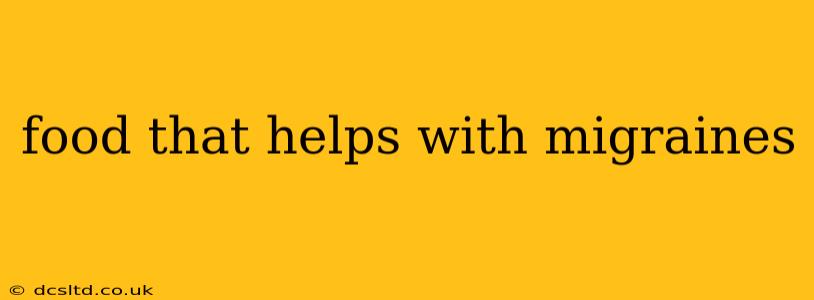Migraines are debilitating headaches that can significantly impact your quality of life. While medical intervention is crucial for severe cases, dietary choices can play a surprisingly significant role in managing migraine frequency and intensity. This comprehensive guide explores foods that can help alleviate migraine symptoms and offers insights into creating a migraine-friendly diet.
What Foods Trigger Migraines?
Before diving into helpful foods, it's crucial to understand potential migraine triggers. Common culprits include processed foods, aged cheeses (like cheddar and blue cheese), cured meats, and foods containing tyramine (found in fermented foods and aged cheeses). Highly processed foods often contain additives like artificial sweeteners, preservatives, and MSG, all of which can trigger migraines in susceptible individuals. Alcohol, especially red wine, is another notorious trigger for many migraine sufferers. Caffeine, while sometimes used for relief, can also trigger migraines if consumed in excess or abruptly withdrawn.
What Foods Can Help Prevent Migraines?
Adopting a diet rich in specific nutrients can significantly contribute to migraine prevention and management. Let's explore some key food groups and their beneficial components:
1. Foods Rich in Magnesium:
Magnesium plays a crucial role in nerve function and muscle relaxation, both of which are affected during a migraine. Good sources of magnesium include:
- Leafy green vegetables: Spinach, kale, and collard greens are excellent sources.
- Nuts and seeds: Almonds, cashews, pumpkin seeds, and flax seeds provide a good dose of magnesium.
- Legumes: Beans, lentils, and chickpeas are also rich in this vital mineral.
- Dark chocolate (in moderation): A small amount of dark chocolate can provide a boost of magnesium, but be mindful of potential caffeine content.
2. Foods Rich in Omega-3 Fatty Acids:
Omega-3s possess anti-inflammatory properties that can help reduce migraine frequency and severity. Excellent sources include:
- Fatty fish: Salmon, tuna, mackerel, and sardines are packed with omega-3s.
- Flaxseeds and chia seeds: These seeds are excellent vegetarian sources of omega-3 fatty acids.
- Walnuts: These nuts also contain a good amount of omega-3s.
3. Foods Rich in B Vitamins:
B vitamins are crucial for nerve function and energy production, both vital for migraine prevention. Good sources include:
- Eggs: A good source of B vitamins, particularly riboflavin (B2).
- Leafy green vegetables: Many leafy greens are also rich in various B vitamins.
- Fortified cereals: Check labels for added B vitamins.
- Lean meats: Chicken and turkey provide B vitamins.
4. Hydration is Key:
Dehydration can be a significant migraine trigger. Ensuring adequate fluid intake throughout the day is crucial. Water is the best choice, but herbal teas (caffeine-free) can also contribute to hydration.
What about Specific Dietary Approaches for Migraines?
Some individuals find success with specific dietary approaches:
-
The Mediterranean Diet: This diet, rich in fruits, vegetables, whole grains, and healthy fats, has been linked to reduced migraine frequency in some studies.
-
Gluten-Free Diet: While not universally effective, a gluten-free diet may help individuals with migraines who also have gluten sensitivity or celiac disease. A proper diagnosis is crucial before eliminating gluten.
-
Keeping a Food Diary: Tracking your food intake and noting any migraine triggers can be invaluable in identifying personal dietary sensitivities and developing an effective management plan.
Are there specific foods I should avoid?
Absolutely. As mentioned earlier, foods high in tyramine, aged cheeses, processed meats, and artificial additives are common migraine triggers for many. Red wine and other alcoholic beverages are also known migraine triggers for a significant portion of the population. It’s crucial to note that triggers vary significantly between individuals.
Can certain foods help during a migraine attack?
While no food can magically stop a migraine in its tracks, some foods can offer comfort and potentially reduce symptoms. For instance, plain toast or crackers can help settle the stomach if nausea is present. However, focusing on gentle, easily digestible foods is key during an attack.
Is there a specific diet plan to follow for migraines?
There isn't one single "miracle" diet for migraines. The best approach is to work with a healthcare professional or registered dietitian to create a personalized dietary plan that addresses your specific triggers and nutritional needs. They can guide you in developing a safe and effective dietary strategy tailored to your individual situation.
This information is for general knowledge and does not constitute medical advice. Always consult with a healthcare professional before making significant dietary changes, especially if you have pre-existing health conditions. They can help you create a safe and effective plan to manage your migraines.
